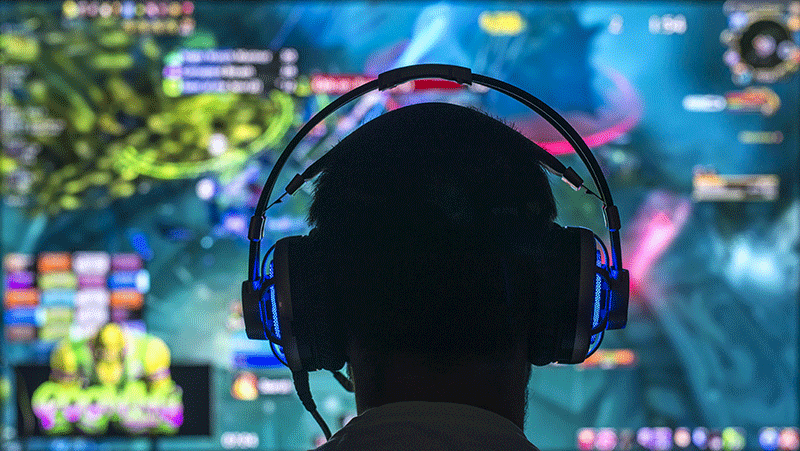Online gaming lifestyle is more than just playing games; it’s a whole world. From the thrill of competition to the bonds forged in virtual communities, this lifestyle offers a unique blend of social interaction, economic opportunities, and technological advancements. This exploration delves into the intricacies of this engaging and evolving phenomenon.
This lifestyle encompasses various aspects, including the diverse types of games, from massive multiplayer online role-playing games (MMORPGs) to esports titles and casual games. We’ll examine the social structures within online gaming communities, the economic models that drive the industry, and the impact on players’ time management and overall well-being.
Defining the Online Gaming Lifestyle
The online gaming lifestyle has evolved significantly from simple multiplayer games to complex virtual worlds. It’s more than just playing games; it’s a multifaceted experience encompassing social interaction, competition, and deep immersion. This lifestyle blends elements of entertainment, social connection, and even professional pursuits.
This lifestyle encompasses a diverse range of activities and interactions, fostering a unique community that transcends geographical boundaries. Players engage in collaborative endeavors, fierce competition, and often, develop lasting relationships within these virtual spaces.
Defining Characteristics of Online Gaming
The online gaming lifestyle is distinct from traditional gaming or other leisure activities due to its reliance on digital platforms and its inherent social component. Players often engage in extensive communication and collaboration, fostering a sense of community and shared experience. This is a significant difference from traditional single-player games or solitary hobbies.
Types of Online Games
Various types of online games contribute to this lifestyle. Massive Multiplayer Online Role-Playing Games (MMORPGs) offer vast virtual worlds, allowing players to create characters, engage in quests, and interact with other players. Esports titles, such as those in the competitive shooter or fighting game genres, involve intense competition and professional-level skill. Casual games, while often simpler, also offer online modes that connect players in social settings. The variety is immense, catering to diverse interests and play styles.
Social Interaction in Online Gaming
Online gaming fosters significant social interaction. Players form communities, teams, and even friendships within these virtual environments. Communication tools like chat, voice chat, and in-game messaging facilitate these interactions, creating a sense of belonging and shared experience. This social interaction is a key component of the online gaming lifestyle, distinguishing it from solitary activities.
Competition and Skill Development
Competition is a driving force in many online games. From ranked matches in esports titles to guild wars in MMORPGs, players often strive to improve their skills and achieve higher rankings. The competitive aspect fosters skill development and encourages strategic thinking, often leading to significant improvements in player abilities.
Immersion and Virtual Worlds
Online gaming often creates immersive virtual worlds, drawing players into a different reality. The level of immersion varies greatly depending on the game, from simple multiplayer environments to highly detailed and complex virtual landscapes. This immersion is a key element that separates online gaming from other forms of entertainment.
Facilitating Technologies and Platforms
A wide range of technologies and platforms facilitate the online gaming lifestyle. Dedicated gaming PCs, consoles, and mobile devices provide the hardware, while internet connectivity enables real-time interaction and access to online game servers. Game engines, such as Unreal Engine or Unity, provide the tools to build and run these virtual worlds.
Evolution of Online Gaming Platforms
| Platform Era | Key Characteristics | Examples |
|---|---|---|
| Early Days (1990s-2000s) | Limited internet access, dial-up connections, simple graphics. Early MMORPGs and multiplayer games emerge. | Early MMORPGs, online FPS games. |
| Console Era (2000s-2010s) | Increased accessibility through consoles, development of online multiplayer for consoles, improved graphics and features. | PlayStation Network, Xbox Live. |
| Mobile Era (2010s-Present) | Ubiquitous mobile devices and widespread internet access, mobile-first games, significant growth in casual online games. | Mobile games, hybrid console/mobile experiences. |
| Metaverse Era (Present-Future) | Immersive virtual worlds, integration of virtual and augmented reality, potential for new social interactions and economies. | Meta’s Horizon Worlds, similar projects. |
Social Dynamics in Online Gaming
Online gaming has fostered unique social structures and communities, distinct from traditional offline settings. Players interact in virtual worlds, forming bonds, rivalries, and even lasting friendships. These interactions, while often entertaining, can also present challenges and complexities. Understanding these social dynamics is key to appreciating the full scope of the online gaming experience.
The social landscape of online gaming is complex, encompassing various levels of interaction and community structure. From casual matches to organized clans, players navigate a spectrum of social interactions. This section explores the intricate social networks and communities found within online gaming, analyzing the roles players take on and comparing these interactions to offline experiences. Positive and negative dynamics within these communities are examined, offering a holistic view of the social fabric of online gaming.
Social Structures and Communities in Online Games
Online games often cultivate intricate social structures. Players organize into communities, clans, or guilds, which often revolve around shared interests and goals within the game. These communities can be based on specific game mechanics, such as teamwork, strategy, or competition. The shared experience of playing together fosters a sense of belonging and camaraderie.
Roles Players Assume Within Online Communities
Players within these communities assume diverse roles. Some are leaders, organizing strategies and motivating their teams. Others are supportive members, providing assistance and encouragement. A significant portion of players focus on individual achievement, participating in competitive matches or solo content. These roles are often fluid, shifting based on the game’s dynamics and player interactions.
Comparison of Online and Offline Social Interactions
Online gaming social interactions differ from offline social settings in several ways. Online interactions are often more anonymous, relying heavily on avatars and usernames. Communication styles can be abbreviated and less nuanced than in face-to-face interactions. However, online communities can provide a sense of belonging and support that might not be as readily available in offline social circles. Strong bonds can form between players, transcending geographical boundaries.
Examples of Positive and Negative Social Dynamics
Positive social dynamics include collaborative efforts, friendly competition, and the formation of lasting friendships. For example, players working together to overcome challenges in a cooperative game or celebrating victories together fosters a positive atmosphere. Negative dynamics include toxic behavior, harassment, and griefing, which can damage the community experience. These issues can arise from differing play styles, frustration, or a lack of understanding of acceptable social norms within the online gaming environment.
Types of Online Gaming Communities
| Type of Community | Characteristics |
|---|---|
| Casual Players | Focus on fun and enjoyment, often participating in social activities and friendly matches. |
| Competitive Players | Driven by a desire for skill and rank advancement, often engaging in structured competitions. |
| Clan/Guild Members | Organized groups with a shared goal, often participating in coordinated activities and large-scale content. |
| Streaming Communities | Players who stream their gameplay, fostering a community around viewing and interacting with streamers. |
| Dedicated Fan Communities | Centered around specific games or franchises, engaging in discussions and sharing content beyond gameplay. |
Economic Aspects of Online Gaming: Online Gaming Lifestyle

Source: gregoryfca.com
Online gaming is more than just a hobby for many; it’s a lifestyle. People are increasingly looking for ways to monetize their gaming skills, and that’s where side hustle trends like in-game item trading or streaming come in handy. Checking out Side hustle trends reveals some interesting possibilities for extra income. This can add another layer to the online gaming lifestyle, potentially making it a more financially rewarding experience.
The online gaming industry is a multi-billion dollar market, fueled by diverse monetization strategies and a thriving esports scene. Understanding the financial dynamics is crucial for anyone interested in this vibrant sector, whether as a player, developer, or investor. From in-app purchases to subscription models, the economic landscape is complex and ever-evolving.
The economic landscape of online gaming is characterized by a variety of monetization methods. This allows developers to generate revenue while players can access games and content. This economic model creates a unique dynamic, influencing how games are designed and consumed. Understanding these economic models and the opportunities and challenges they present is key to grasping the industry’s overall success.
Monetization Models in Online Gaming
Various monetization strategies are employed to generate revenue for online game developers. These models cater to different player preferences and gaming experiences.
- In-app purchases (IAPs): This is a prevalent method where players can buy virtual items, cosmetic enhancements, or power-ups within the game. The allure of personalization and enhanced gameplay experiences often drives players to make these purchases. For example, players might buy skins for their avatars or powerful weapons to gain an advantage.
- Subscriptions: Some games offer premium content or features for a recurring fee. This model allows for consistent revenue streams for developers and provides players with exclusive access. This approach can be seen in games that offer ongoing updates and features.
- Advertising: Games can integrate advertisements into the gameplay experience, such as banner ads or in-game commercials. This model is often employed in free-to-play games to offset the costs of development and maintenance.
- Transaction-based purchases: Players make one-time purchases for items, often based on in-game currency or real-world currency. This model is frequently used for specific items or content within the game.
Economic Opportunities in Online Gaming
The online gaming sector presents a range of economic opportunities, from developing games to creating related businesses.
- Game Development Careers: Developing games requires a diverse range of skills, including programming, design, and art. This sector provides employment opportunities for talented individuals in these fields.
- Esports Careers: The growth of esports has led to opportunities in professional gaming, coaching, streaming, and management. Players can become professional gamers, earning substantial income through tournament winnings and sponsorships.
- Content Creation: Streaming, creating guides, or producing related content provides income opportunities for individuals with a passion for gaming.
- Merchandising: Merchandise related to popular games can be profitable. This includes clothing, accessories, and collectibles.
Economic Challenges in Online Gaming
Despite the opportunities, online gaming faces various economic challenges.
- Competition: The online gaming market is highly competitive, requiring developers to continuously innovate and adapt to maintain their market share.
- Financial Risks: Developing and launching a successful game involves significant financial investment, with no guarantee of return.
- Maintaining Player Interest: Games need to be engaging and provide ongoing content to keep players interested and invested over time.
Successful Online Gaming Businesses and Strategies
Several businesses have demonstrated success in the online gaming industry.
- Riot Games (League of Legends): Riot’s strategy emphasizes a strong community and continuous updates to keep players engaged. They’ve leveraged a robust esports scene and in-game purchases to achieve significant revenue.
- Activision Blizzard (Call of Duty): Activision Blizzard has capitalized on popular franchises and successful game mechanics to achieve widespread appeal and revenue.
- Supercell (Clash of Clans, Clash Royale): Supercell’s focus on mobile gaming and simple, accessible gameplay has resulted in significant success in the mobile market.
Revenue Streams for Online Game Developers
| Revenue Stream | Description |
|---|---|
| In-app Purchases | Revenue generated from virtual items and upgrades. |
| Subscriptions | Recurring revenue from premium features or content. |
| Advertising | Revenue from advertisements integrated into the game. |
| Transaction-based Purchases | One-time revenue from purchases of items. |
| Esports Revenue | Revenue generated from tournaments, sponsorships, and viewership. |
Economic Impact of Esports on Online Gaming
Esports has significantly impacted the online gaming landscape, creating new economic opportunities and changing the way games are developed and consumed.
- Increased viewership and revenue: Esports tournaments attract large viewership, generating substantial revenue from sponsorships, advertising, and ticket sales.
- Professionalization of gaming: Esports has fostered the professionalization of gaming, with dedicated players and teams competing for prize money and recognition.
- Game development influence: Esports can influence game development, with developers prioritizing competitive elements to cater to the growing esports market.
Time Management and Lifestyle Impacts
Online gaming, while offering a thrilling and social experience, can significantly impact a gamer’s time management and overall lifestyle. Balancing gaming with other responsibilities, like school, work, or personal life, requires careful planning and discipline. Understanding the time commitment and potential consequences of excessive gaming is crucial for a healthy lifestyle.
The level of engagement in online gaming varies greatly, impacting the amount of time spent on the activity. Casual gamers might play for a few hours a week, while hardcore players dedicate a substantial portion of their free time. This difference in commitment directly influences how online gaming affects daily routines and relationships.
Time Commitment for Different Gaming Levels
Different online games require varying levels of commitment. Casual games, often focused on short bursts of gameplay, can be integrated into existing schedules more easily. In contrast, competitive multiplayer games or role-playing games often demand a significant time investment, potentially impacting other activities. The choice of game significantly influences the time spent.
Potential Impacts on Daily Routines and Relationships
Online gaming can significantly impact daily routines, leading to missed appointments, neglected chores, or poor sleep quality. For some, the allure of the virtual world can overshadow real-world interactions, potentially straining relationships with family and friends. Balancing online and offline activities is crucial to maintaining healthy relationships and a balanced lifestyle. This balance is particularly important for students and working professionals.
Successful Time Management Strategies for Online Gamers
Successful time management for online gamers involves planning and prioritization. Setting realistic goals for gaming sessions, sticking to a schedule, and using time management tools can help maintain a healthy balance. Gamers can use calendars, to-do lists, or dedicated apps to structure their gaming time.
- Scheduling Gaming Sessions: Allocate specific time slots for gaming, similar to scheduling appointments. This helps avoid spontaneous gaming sessions that encroach on other responsibilities.
- Prioritizing Responsibilities: Determine which tasks are most important and schedule gaming sessions around them. This ensures that essential obligations are met before gaming time.
- Using Time Management Tools: Employ time management apps or techniques to track time spent on gaming and other activities. This helps in recognizing patterns and making adjustments.
Negative Consequences of Excessive Online Gaming
Excessive online gaming can have several negative consequences. It can lead to social isolation, neglecting real-world interactions, and impacting physical health through sedentary behavior. In extreme cases, it can even contribute to addiction and mental health issues. Understanding the potential for negative consequences and establishing healthy boundaries is vital.
Table Comparing Time Commitments of Different Game Types
| Game Type | Time Commitment (Estimated) | Description |
|---|---|---|
| Casual Games (e.g., puzzle, match-3) | 1-3 hours per week | These games often have short sessions and can be integrated into a daily routine easily. |
| Competitive Multiplayer (e.g., FPS, MOBA) | 5-10+ hours per week | These games demand significant time investment for skill development and consistent performance. |
| Role-Playing Games (RPGs) | 10+ hours per week | These games can have complex storylines and extensive gameplay, often requiring a large time commitment. |
| MMORPGs (Massively Multiplayer Online Role-Playing Games) | 20+ hours per week | MMORPGs are often characterized by their continuous gameplay, demanding significant time investment. |
Note: Time commitments are estimates and can vary greatly based on individual play styles and game complexity.
Technological Advancements and Future Trends
The online gaming landscape is constantly evolving, driven by rapid technological advancements. These advancements are reshaping not only the *how* but also the *why* and *what* of online gaming, impacting everything from gameplay mechanics to social interactions. This section delves into the transformative power of technology on the online gaming lifestyle, highlighting key trends and their potential impact.
Impact of Technological Advancements
Technological advancements have dramatically altered the online gaming experience. Faster processing speeds, improved graphics, and more sophisticated networking capabilities have made games more immersive and engaging. This has led to a wider range of game genres, more complex narratives, and enhanced social interaction features. Examples include the rise of realistic graphics in games like The Witcher 3 or the development of highly competitive online multiplayer games. These advancements have broadened the appeal of online gaming, attracting a much larger and more diverse player base.
Emerging Technologies Shaping the Future
Several emerging technologies are poised to revolutionize the online gaming industry. These include advancements in artificial intelligence (AI), virtual and augmented reality (VR/AR), and cloud computing. AI is being used to create more dynamic and responsive game environments, personalized experiences, and increasingly sophisticated non-player characters (NPCs). The potential for AI to enhance narrative and gameplay is vast. The use of cloud computing in gaming is also gaining traction, enabling players to access high-quality games with minimal hardware requirements, and it reduces the burden on individual players’ devices.
Virtual Reality (VR) and Augmented Reality (AR)
VR and AR are poised to significantly impact online gaming experiences. VR immerses players in a completely digital environment, providing a sense of presence and interaction that surpasses traditional gaming methods. AR, on the other hand, overlays digital content onto the real world, offering innovative possibilities for interactive experiences. Examples of VR in gaming include immersive first-person shooters or virtual role-playing games that transport players to entirely new worlds. AR could create augmented game environments where players interact with digital elements within their physical space.
Cloud Computing and High-Speed Internet
Cloud computing plays a crucial role in facilitating the online gaming lifestyle. It allows for seamless access to games and online services, regardless of the player’s hardware capabilities. This means players can enjoy high-quality games without needing high-end computers or consoles. The availability of high-speed internet is also essential. It provides the bandwidth required for smooth gameplay, real-time interactions, and high-definition graphics in multiplayer games. This is especially important for online multiplayer games that rely on instantaneous communication between players.
Projected Technological Trends
| Trend | Description | Impact |
|---|---|---|
| Enhanced AI | More sophisticated AI for NPCs, dynamic game environments, and personalized player experiences. | More immersive and engaging gameplay, tailored to individual preferences. |
| Immersive VR/AR | Virtual and augmented reality technologies are transforming the way games are played and experienced. | Increased sense of presence and interaction, leading to more engaging and innovative gameplay experiences. |
| Cloud Gaming | Cloud-based gaming platforms are becoming more accessible and feature-rich, offering a wider range of games. | Reduced reliance on high-end hardware, increased accessibility to a wider range of games. |
| 5G and Beyond | High-speed 5G and beyond internet connectivity will further improve online gaming experiences, enabling ultra-low latency. | Improved responsiveness and real-time interaction in online multiplayer games, especially for remote players. |
Health and Well-being Considerations
Online gaming, while offering social connection and entertainment, can negatively impact health if not approached responsibly. Understanding the potential risks and implementing strategies for healthy engagement are crucial for a balanced lifestyle. This section will delve into the physical and mental health implications of excessive gaming, and provide practical advice for maintaining a healthy routine.
Excessive online gaming can lead to a range of physical and mental health issues. These can range from simple discomfort to more serious conditions. It’s essential to recognize the potential consequences and proactively implement strategies to mitigate these risks.
Potential Health Implications of Excessive Gaming
Excessive gaming can negatively impact physical and mental health. Physical consequences include eye strain, repetitive strain injuries (RSI) from prolonged keyboard and mouse use, and poor posture leading to back pain. Lack of physical activity due to prolonged sedentary gaming can contribute to weight gain and cardiovascular problems. Mental health concerns include sleep disturbances, anxiety, depression, and social isolation. These issues are not exclusive to gaming; they are potential outcomes of any activity done excessively.
Strategies for Maintaining a Healthy Lifestyle, Online gaming lifestyle
Maintaining a healthy lifestyle while gaming involves establishing healthy boundaries and routines. Prioritize regular physical activity, ensuring adequate sleep, and taking frequent breaks during gaming sessions. This includes incorporating regular exercise, maintaining a balanced diet, and practicing mindfulness or relaxation techniques.
Importance of Establishing Healthy Boundaries and Routines
Establishing healthy boundaries and routines is vital. These boundaries should include setting time limits for gaming, creating designated gaming spaces, and integrating gaming into a balanced schedule. Consistent routines, like regular mealtimes and sleep schedules, will support a healthy lifestyle. This also includes setting clear limits on the amount of time spent gaming, and avoiding gaming during crucial times such as studying or work.
Resources for Individuals Struggling with Online Gaming Addiction
If individuals are struggling with online gaming addiction, seeking support is crucial. Various resources are available, including support groups, online forums, and professional counseling. Talking to a trusted friend, family member, or healthcare professional can be a valuable first step. Seeking professional help from a therapist or counselor specializing in behavioral addictions can offer tailored strategies for overcoming the issue.
Table Summarizing Health Risks and Preventative Measures
| Health Risk | Preventative Measures |
|---|---|
| Eye strain | Regular eye breaks, adjusting screen brightness, using eye drops. |
| Repetitive strain injuries (RSI) | Ergonomic setup, taking frequent breaks, using wrist supports. |
| Poor posture | Using an ergonomic chair, maintaining good posture during gaming sessions, regular stretching. |
| Lack of physical activity | Scheduling regular exercise, incorporating physical activities into daily routine, walking or cycling during breaks. |
| Weight gain | Maintaining a balanced diet, incorporating regular exercise. |
| Sleep disturbances | Establishing a regular sleep schedule, creating a relaxing bedtime routine, avoiding caffeine or screen time before bed. |
| Anxiety/depression | Maintaining social connections outside of gaming, seeking professional help if needed, engaging in mindfulness or relaxation techniques. |
| Social isolation | Scheduling time for social activities, maintaining connections with friends and family, joining gaming communities with social elements. |
Summary
In conclusion, the online gaming lifestyle is a complex and multifaceted experience. It’s a dynamic world shaped by technology, social interaction, and economic factors. While offering exciting opportunities, it also comes with considerations for time management, health, and well-being. The future of online gaming promises even more innovation and evolution, making it a captivating field to watch and understand.
FAQ Resource
What are some common monetization models in online gaming?
Common monetization models include in-app purchases, subscriptions, and advertising. Some games even utilize a combination of these methods.
How does online gaming impact real-world relationships?
Excessive online gaming can potentially strain relationships with family and friends due to time commitment. However, many players successfully manage their time to maintain healthy connections.
What are some health risks associated with online gaming?
Excessive gaming can lead to eye strain, carpal tunnel syndrome, and other physical issues. Mental health concerns like isolation and anxiety can also arise.
What are some examples of successful esports athletes?
Many successful esports athletes have emerged in various titles, showcasing exceptional skill and dedication. Their careers provide inspiring examples for aspiring professional gamers.
Online gaming is a pretty popular lifestyle these days, with tons of people spending hours in virtual worlds. But, what about the energy consumption of all those servers powering these games? That’s where sustainable architecture comes in handy. Sustainable architecture can help design data centers that use less energy, which is a huge plus for the environment.
This ultimately benefits the online gaming community, too, as it can make the entire experience more sustainable.
Online gaming is more than just fun; it can be a pathway to exploring passive income streams. Many gamers are finding ways to monetize their skills and time, like creating tutorials or selling in-game items. There are a bunch of strategies for turning your online gaming lifestyle into a source of regular income, and these Passive income streams can help you explore that.
Ultimately, this opens up new opportunities to enhance your overall online gaming experience.
Online gaming is a pretty popular lifestyle choice these days, offering a whole different kind of social interaction. It can be a great way to unwind and connect with people, but it’s important to remember that a healthy balance is key. Sometimes, a more structured lifestyle like a Corporate lifestyle can provide a contrasting perspective on work-life balance, and ultimately, the best gaming lifestyle is one that complements your overall well-being.
Online gaming is a pretty popular lifestyle these days, and a good home office setup is key to a smooth experience. Having a dedicated space, like a proper Home office setup , really helps with focus and comfort during those long gaming sessions. Ultimately, a comfortable and optimized setup makes a huge difference in the overall online gaming lifestyle.




